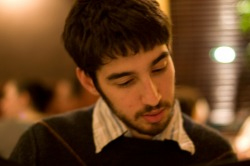Making History: The Proliferation and Impact of Modern Jewish Archives - Interview with Jason Lustig
 Jason Lustig
Jason LustigOn September 16, 2013, Jason Lustig, a Ph.D. candidate in the History Department at UCLA, will deliver a lecture at YIVO on his ongoing research on the emergence of modern Jewish archives from the turn of the twentieth century through the 1950s. Lustig is the recipient of the Max Weinreich Center's current Professor Bernard Choseed Memorial Fellowship and the Natalie and Mendel Racolin Memorial Fellowship.
Here is an excerpt of his interview with Yedies editor Roberta Newman.
JL: My dissertation is a history of modern Jewish archives during the twentieth century, from about 1900 or so through the 1950s. I’m studying the emergence of Jewish archives on a number of different planes, but with the overall inquiry being really focused on the question: Why is it that Jews are creating archives? Why are they doing it at the particular times and places that they do them? And what is the meaning of the creation of archives, both for the establishment of modern Jewish history as an academic discipline, but also in addition to that, within a broader realm of the development of Jewish life?
So we’re seeing a worldwide network of Jewish archives being established during the first half of the twentieth century. I’m looking at a group of Jewish archives in the United States, in Palestine, and later the state of Israel, and in Europe.
RN: Can you name some of the archives that you’re focusing on?
JL: In addition to YIVO, which is one of the key archives that gets established in the early part of the twentieth century, I’m looking at a group of institutions including the Gesamtarchiv der deutschen Juden, which was established in Berlin in 1905; the American Jewish Archives, which is still today in Cincinnati; the Leo Baeck Institute, which of course is here in New York together with YIVO at the Center for Jewish History; and the Central Zionist Archives and the Central Archives for the History of the Jewish People, which are both in Jerusalem.
RN: What has been emerging from your work so far in terms of themes?
JL: I think one of the most interesting elements is the ubiquity of Jewish archives. When we look around today in our daily lives, everything has an archive. I go to Gmail and I don’t delete an email, I archive it. If we look back one hundred years ago, we can begin to see the impulse to create archives manifesting itself in a really powerful way in Jewish life, more or less all over the world.
RN: Why do you think knowing more about how and why Jewish archives came about is so important for our understanding of Jewish history and scholarship? What has been the relationship of Jewish archives to the broader Jewish community?
JL: For me, the study of the history of Jewish archives is particularly fascinating and exciting because, as historians, these are the tools that we use every day. But they didn’t always exist.
When we talk about what it means to be a historian, and what it means to be a Jewish historian or someone who studies modern Jewish history, or any part of Jewish history, we have to ask these questions: “Where do the sources come from that we’re using? Why is it that we have access to these particular sources and not other ones?”
If you go back to someone like Jacques Derrida, who writes about the archive, what makes an archive an archive is that there’s an archivist blocking the door to access. The archive is meant to preserve and to protect, often at the expense of access. This is not always the case, there are a lot of archives which are very open, but there are a lot of archives that don’t get used, because they aren’t very open. If you look at the history of archives, it’s in many ways a process of gradual opening up of state archives. They were really, when you get down to it, originally the private papers of the king or of the queen or of the ruler, and when you look at the development of the history of archives as a whole, archives are meant to be closed. For instance, it was an excommunicable offense to go into the Vatican Archives until the late nineteenth century, and the purpose of the archivist was to keep people out. So when you look at this tradition of the archive as a closed space, this question of what is the relationship to the broader community is very complicated, because in a lot of ways the purpose of the archive was to not have a relationship with the community. This is very different today in a lot of ways. And I think that the creation of Jewish archives is in some ways a part of this transformation.
Register to attend Making History: The Proliferation and Impact of Modern Jewish Archives, Monday, September 16, 7:30 pm.
Find out how to apply for Max Weinreich Center Research Fellowships.




